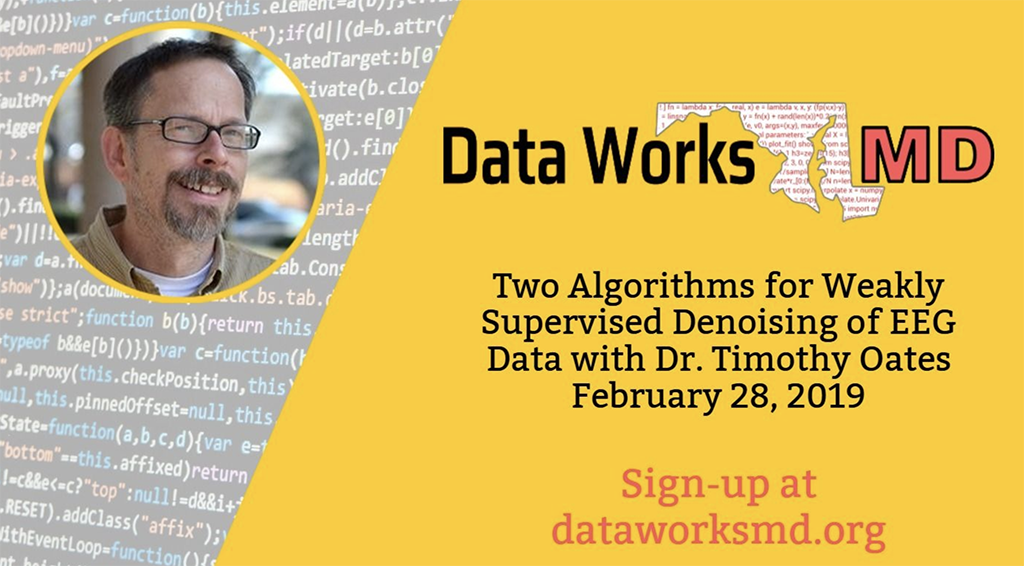The February meeting of the Data Works MD Meetup features a talk by UMBC Professor Tim Oates on Two Algorithms for Weakly Supervised Denoising of EEG Data, 6:30-9pm Thursday, February 28, 2019 at UMBC’s South Campus. Join the meetup and register to attend this free talk and network with members of the Maryland data science community. The talk abstract and Dr. Oates’s biosketch are given below.
Electroencephalogram (EEG) data is used for a variety of purposes, including brain-computer interfaces, disease diagnosis, and determining cognitive states. Yet EEG signals are susceptible to noise from many sources, such as muscle and eye movements, and motion of electrodes and cables. Traditional approaches to this problem involve supervised training to identify signal components corresponding to noise so that they can be removed. However, these approaches are artifact specific. In this talk, I will discuss two algorithms for solving this problem that uses a weak supervisory signal to indicate that some noise is occurring, but not what the source of the noise is or how it is manifested in the EEG signal. In the first algorithm, the EEG data is decomposed into independent components using Independent Components Analysis, and these components form bags that are labeled and classified by a multi-instance learning algorithm that can identify the noise components for removal to reconstruct a clean EEG signal. The second algorithm is a novel Generative Adversarial Network (GAN) formulation. I’ll present empirical results on EEG data gathered by the Army Research Lab, and discuss pros and cons of both algorithms.
Dr. Tim Oates is an Oros Family Professor in the Computer Science Department at the University of Maryland, Baltimore County. His Ph.D. from the University of Massachusetts Amherst was in the areas of artificial intelligence and machine learning with a focus on situated language learning. After working as a postdoctoral researcher in the MIT Artificial Intelligence Lab, he joined UMBC where he has taught extensively in core areas of Computer Science, including data structures, discrete math, compiler design, artificial intelligence, machine learning, and robotics. Dr. Oates has published more than 150 peer-reviewed papers in areas such as time series analysis, natural language processing, relational learning, and social media analysis. He has developed systems to determine operating room state from video streams, predict the need for blood transfusions and emergency surgery for traumatic brain injury patients based on vital signs data, detect seizures from scalp EEG, and find story chains (causal connections) joining news articles, among many others. Recently Dr. Oates served as the Chief Scientist of a Virginia-based startup where he developed architectures and algorithms for managing contact data, including entity linking, fuzzy record matching, and connected components on billion node graphs stored in a columnar database. He has extensive knowledge of machine learning algorithms, implementations, and usage.
